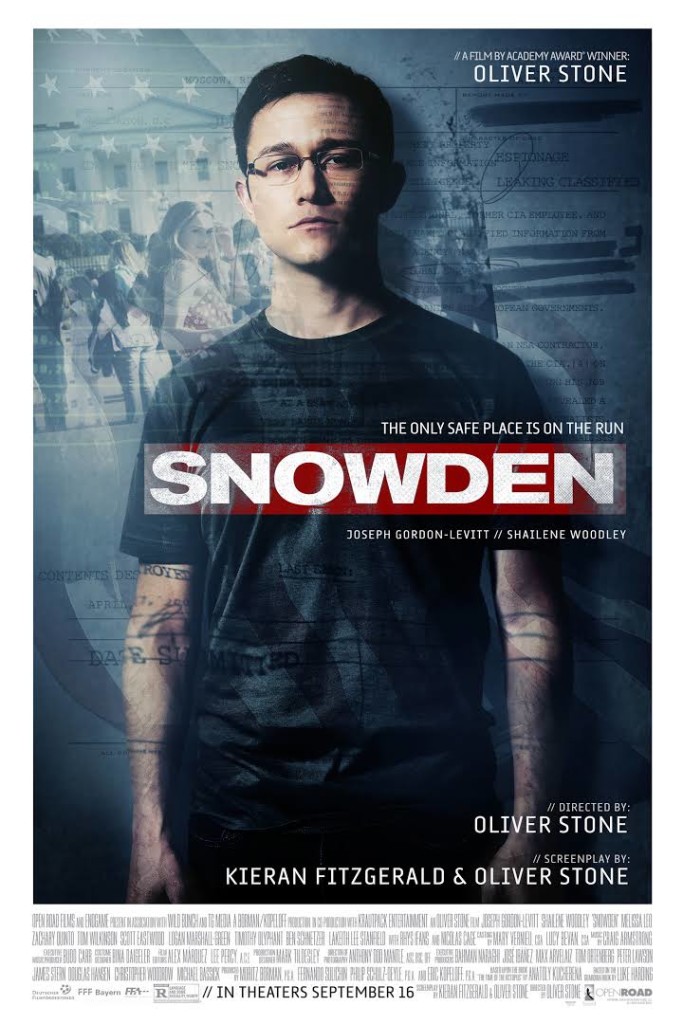Broinowski, Alison*
‘Your laptop is watching you: Snowden the movie – review note’, Honest History, 26 September 2016
Before Snowden comes on, there’s a short film of Oliver Stone, the director, warning cinema audiences that they can be surveilled, so please turn off their devices. Even as a humourless joke for geeks, it sets the sombre tone of the movie to follow. This is a feature version of Linda Poitras’ Citizenfour (2014) that adds political and personal narratives to the story of the young intelligence employee who exposed America’s mass surveillance of the world’s communications.
 Stone has an actor (Joseph Gordon-Levitt) playing Edward Snowden, the bespectacled ex-Army trainee, ex-CIA recruit, ex-Booz Allen Hamilton employee, ex-National Security Agency systems administrator. Other actors play Poitras and Snowden’s girlfriend Lindsay Mills, as well as Glenn Greenwald and Ewen MacAskill, both then journalists at the Guardian. Another lookalike is Alan Rusbridger, editor-in-chief of the Guardian in 2014, which published ‘the top-secret files of the world’s most powerful intelligence organisations’ (Luke Harding, The Snowden Files, 2014, p. 1).
Stone has an actor (Joseph Gordon-Levitt) playing Edward Snowden, the bespectacled ex-Army trainee, ex-CIA recruit, ex-Booz Allen Hamilton employee, ex-National Security Agency systems administrator. Other actors play Poitras and Snowden’s girlfriend Lindsay Mills, as well as Glenn Greenwald and Ewen MacAskill, both then journalists at the Guardian. Another lookalike is Alan Rusbridger, editor-in-chief of the Guardian in 2014, which published ‘the top-secret files of the world’s most powerful intelligence organisations’ (Luke Harding, The Snowden Files, 2014, p. 1).
That doesn’t mean the movie is all fictionalised. In the very Mira Hotel in Hong Kong where Snowden actually met Poitras, Greenwald, and MacAskill, Stone films Snowden, fearful of detection, meeting them with a password, and then secreting their mobile phones in a microwave. He puts sticking plaster over the ‘eye’ above his screen, and takes cover under a sheet to use his laptop. All this plus his escape to Moscow, courtesy of the Hong Kong authorities, is just as it reportedly happened.
Verging on the fanciful in the Stone movie, however, is a tense moment when Snowden passes through the secure exit of his Hawaii workplace, using a Rubik’s cube to hide a SIM card with all the files of the world’s biggest intelligence heist on it. In fact, he used several thumbdrives. Also with an eye for box-office appeal, apparently, the film stresses Snowden’s conservative credentials: asked in an interview which is the greatest country in the world he unhesitatingly declares, the United States. He tells his boss at the CIA that he’s a fan of Ayn Rand but Harding says he really admired Ron Paul. Paul was a Republican who was then so far to the right that he was an ultra-libertarian − although that was before Trump. And the film traces Snowden’s sometimes tense relationship with Mills, whom he deserted in Hawaii; whether this is accurate or not we don’t know.
In real life Snowden, the son of a United States Coastguard officer, was a convinced defender of the Constitution and its free speech guarantee, as the films and books affirm. No hacker, but a conscience-driven IT wizard, he admired what Bradley Manning had done, and gave himself the code-name ‘Verax’, referencing Julian Assange’s ‘Mendax’. He believed George W. Bush betrayed his oath of office by authorising warrantless electronic surveillance, both of US and foreign citizens, to pursue the ‘war on terror’. ‘It’s not about terrorism’, Snowden says in the movie. ‘It’s all about social and economic control’ – as Assange has also argued (The Wikileaks Files, 2015).
Snowden welcomes candidate Obama’s pledge of ‘no more ignoring the law when it is convenient’ and his promise to end this practice, but is disgusted to see Obama expand surveillance after becoming President. Stone inserts real footage of Obama claiming the US now has ‘the right balance’ between liberty and invigilation. He also shows a US drone strike on a target in Iraq, in which not only a suspect truck but also civilian passers-by are blown to bits. You can’t win wars without this happening, says a US intelligence official. Snowden is outraged, as he is also when James Clapper, Director of the National Security Agency, lies to Congress about ‘wittingly’ conducting unlawful surveillance.
 Oliver Stone (Twitter)
Oliver Stone (Twitter)
Snowden’s CIA mentor in the film makes him recite a mantra that starts with the US under threat, collecting intelligence about those who threaten it, then fighting them. So that’s alright then. Stone’s Snowden also lists the American whistleblowers whose lives and careers have been trashed because they objected to the National Security Agency’s omnivorous electronic surveillance, and its ‘direct access’ to the big internet companies’ servers (Harding 2014, p. 11). No mention is made in the movie of Chelsea Manning, who is in jail for passing US diplomatic cables to WikiLeaks, nor of Assange, whose fate for publishing them remains as uncertain as Snowden’s.
Snowden, Manning and Assange are collaterally damaged by the cumulative consequences of 9/11, as we all are. The more the conservative media trash the whistleblowers’ reputations, and the more officials in several countries seek to prevent them regaining their liberty, the more we suspect that everyone’s freedom to think, say, and write is on the line. Particularly in countries like Australia, which don’t have the protection of a First Amendment.
Oliver Stone makes good movies. Both Snowden and the film of his book with Peter Kuznick, The Untold History of the United States (2012) expose as only American sources can the sub-surface instability beneath the ‘indispensable country’. Although Snowden tells us nothing most of us don’t know, it’s important to be reminded.
* Dr Alison Broinowski, formerly an Australian diplomat, is Vice-President of Honest History and of Australians for War Powers Reform.
A slightly edited version of this post is on Pearls and Irritations. Another review by Luke Buckmaster in Daily Review.

